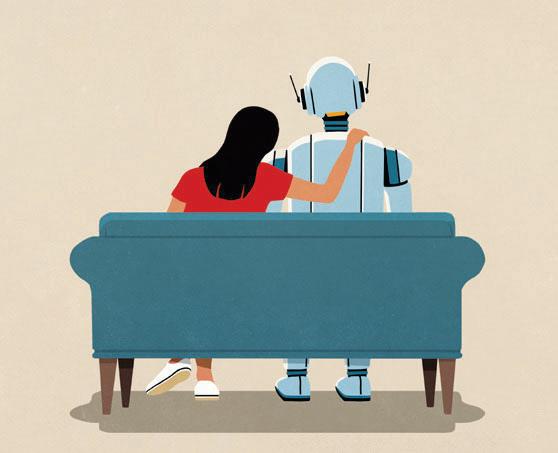Prøve GULL - Gratis
Are AI Chatbots Healthy for Teens?
Scientific American
|December 2025
Kids crave approval from their peers. Chatbots offer an alternative to real-life relationships, but they can come at a price

RELATIONSHIPS ARE MESSY, whether you are an adult with lots of experience or a kid navigating tough times with a best friend, boyfriend or girlfriend. You can’t predict moods, interests or desires. For teens learning the ins and outs of relationships for the first time, disagreements, fights and breakups can be crushing.
But what if your teen’s best friend weren’t human? It may seem far-fetched, but it’s not. A recent report from Common Sense Media says 72 percent of teens surveyed have used artificial-intelligence chatbot companions, and 33 percent have relationships or friendships with them.
The language that AI companions use, the responses they offer and the empathy they exude can make a user think they truly understand and sympathize. These chatbots can make someone feel liked or even loved. They are programmed to give users the experience of a real connection. And adolescents have a natural interest in romance and sexuality; if they feel ignored by the kids in their high school, well, now on the nearest screen there is a hot girlfriend who is constantly fascinated by them and their video games or a supercute boyfriend whom they never have to engage in small talk with to form a bond.
This may be perplexing to some parents, but if your child is navigating the complex worlds of technology, social media and AI, the likelihood of their being curious about an AI companion is pretty high. Here’s what you need to know to guide them.
Denne historien er fra December 2025-utgaven av Scientific American.
Abonner på Magzter GOLD for å få tilgang til tusenvis av kuraterte premiumhistorier og over 9000 magasiner og aviser.
Allerede abonnent? Logg på
FLERE HISTORIER FRA Scientific American
Scientific American
Will We Run Out of Rare Earth Elements?
These valuable but difficult-to-extract metals are increasingly important to modern life
1 mins
December 2025

Scientific American
Copyright Laws Can Stop Deepfakes
The U.S. should give its residents rights to their own face and voice
4 mins
December 2025

Scientific American
50, 100 & 150 Years
“The list of first-aid procedures that the medical profession encourages laypeople to undertake is short because of concern that tactics applied in ignorance may do more harm than good.
3 mins
December 2025

Scientific American
Dramatic Atmosphere
Exoplanet TOI-561 b has air where none should persist
2 mins
December 2025

Scientific American
The Mother of Depressions
Postpartum depression is a leading cause of death among new mothers. A new type of drug offers better, faster treatment
16 mins
December 2025

Scientific American
Going Rogue
A massive study may improve the prediction of dangerous rogue waves
3 mins
December 2025

Scientific American
Phages Caught Sleeping
Bacteria use hibernating viruses to immunize themselves
2 mins
December 2025
Scientific American
THE COVERT HERBARIUM OF CRYPTOGAMIC BOTANY
A century ago a father and a son labored to replicate the intricate structure of nearly eight hundred species of plants in four thousand delicate models.
1 min
December 2025

Scientific American
Are AI Chatbots Healthy for Teens?
Kids crave approval from their peers. Chatbots offer an alternative to real-life relationships, but they can come at a price
5 mins
December 2025

Scientific American
The Myth of the Designer Baby
Parents beware of any genomics firm saying it can help them with “genetic optimization” of their embryos
5 mins
December 2025
Listen
Translate
Change font size
